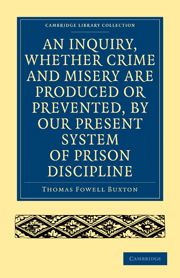AN INQUIRY, &c
Published online by Cambridge University Press: 05 February 2012
Summary
Magna Charta declares that no freeman shall be taken or imprisoned, but by the lawful judgment of his equals, or the law of the land.
When a prisoner is convicted by the “lawful judgment of his equals,” imprisonment is sometimes a part, and sometimes the whole of the penalty awarded against him; and evidently with the strictest justice, because it is proved that he has been guilty of an offence, and this is the appointed punishment.
But the “law of the land” finds it necessary to depart from this rigid rule of equity, which would abridge only that man of his freedom, who had been pronounced a delinquent by the verdict of his peers. The security of the whole demands, that the liberty of some should be suspended for a certain period. Persons are accused of crimes–they may be innocent, or they may be guilty: but their detention is necessary until the time arrives in which one or the other can be established; yet, they are innocent in the eye of the law, till their guilt is proved; and in this case imprisonment is not imposed as a penalty, it is merely permitted as the only method of insuring the appearance of the person suspected, on the day of trial.
- Type
- Chapter
- Information
- An Inquiry, whether Crime and Misery are Produced or Prevented, by our Present System of Prison Discipline , pp. 1 - 18Publisher: Cambridge University PressPrint publication year: 2009First published in: 1818



